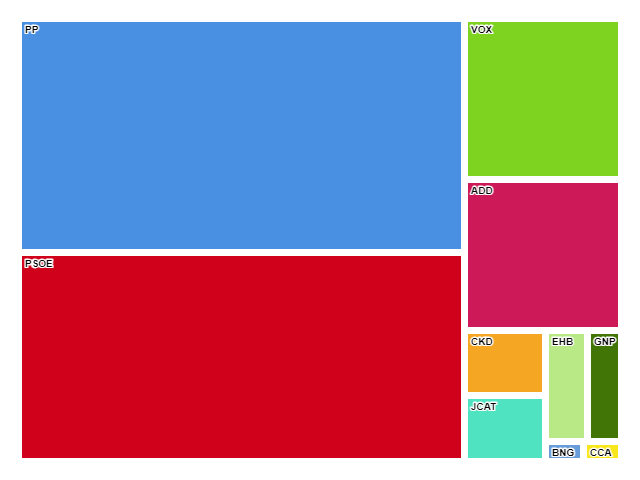Uncertainty reigns in Spain following Sunday’s snap elections as no party or partnership of two parties picked up enough seats for an outright majority in the parliament, meaning that Socialist incumbent Prime Minsiter Pedro Sánchez may yet cling on to power with the backing of Catalonian separatists.
Hopes have seemingly been dashed for a conservative-populist coalition sweeping to power in Spain, for now at least, with the centre-right People’s Party (PP) performing below expectations to such a degree that even partnering with the populist VOX party would not secure a governing majority in the parliament, El Mundo reports.
While Alberto Núñez Feijóo’s PP is currently projected to have won 136 seats compared to 122 for Prime Minister Sánchez’s Socialist Workers’ Party (PSOE), it is far below the needed 176 for a majority. The populist VOX party performed largely on par with expectations, with over 3 million Spaniards backing the party for about 12.4 per cent of the vote share. Yet, this was only enough for 33 votes in the parliament, meaning that they cannot by themselves put the People’s Party over the threshold for forming a government, falling seven seats short.
The next largest party was the newly formed Sumar (Unite) collective of smaller leftist parties created in the wake of the departure of far-left Pablo Iglesias from active politics and the subsequent collapse of the leftist Unidas Podemos party. Sumar, founded by active Communist Party member and current Labour Minister Yolanda Díaz, managed to pick up 31 seats in the parliament. This, however, was not enough to put Sánchez’s Socialists over the top, being 23 seats short.
With neither the left nor the right faction gaining enough seats to form a government, the fate of Spain may rest with a party that actively wants to see the country break apart, the Catalonian separatist Junts per Catalunya (Together for Catalonia) party, which secured seven seats in the national parliament on Sunday.
Socialist Spanish PM Calls For Snap General Election After Disastrous Results in Local Votehttps://t.co/CtHuajyb8n
— Breitbart London (@BreitbartLondon) May 29, 2023
Although Junts is broadly speaking representative of the centre-right faction of those who wish to see the Catalonia region declare independence from the rest of Spain, joining a coalition with VOX may be a hard sell given that the populist party of Santiago Abascal has expressly called for separatist parties to be outlawed in Spain.
It is also likely that Junts would have more to gain from aiding Sánchez’s return to power. Demonstrating this, Miriam Nogueras, the leading candidate for the party, said on Sunday that her party will not back the Socialists without ample compensation in return, bluntly stating: “We will not make Sánchez prime minister for nothing.”
Backroom dealing between Sánchez and the separatists will likely commence on Monday, but the haggling process could take weeks if not months.
The prime minister will be seeking Junts to abstain from voting in the first round of the parliamentary government selection process. Should Junts abstain, Sánchez would likely return to government, however, should the Catalonian separatist party vote against both the left and the right blocs, then it would likely trigger a fresh election.
Supermarkets Allowed to Begin Rationing, Says Spain’s Socialist Government https://t.co/OArcFW3EKV
— Breitbart London (@BreitbartLondon) April 2, 2022
In the wake of the disappointing results on Sunday, PP leader Alberto Núñez Feijóo attempted to salvage something from the evening, boasting that his was “the most voted for party” in the country and therefore it should be given the chance to “open a dialogue to try to govern.”
Yet, even his own supporters were not impressed by the failure of the party to secure enough seats to form a government. As Feijóo appeared on a balcony in Génova following the results, the crowd chanted over him “Ayuso, Ayuso!”, the name of the populist president of the Community of Madrid, Isabel Díaz Ayuso, whom many see as a potential replacement as leader of the People’s Party.
For VOX leader Santiago Abascal, who was on the precipice of being a leading figure in the European populist movement, the evening was a bitter pill to swallow. The plainspoken Basque Country politician laid the blame at the feet of Feijóo, chastising the PP leader for complacency ahead of the election, saying that he “sold the bear’s skin before hunting it”.
Abascal also took aim at the establishment media, which rallied within Spain and internationally to stoke fears about the supposed rise of the “far-right”, a label which VOX rejects. Abascal claimed that there was a “manipulation of public and private media” to prevent the populists from gaining power in Spain.
Still, the VOX leader vowed to continue fighting for the future of his country, saying in a speech to supporters in Madrid: “More than 3 million Spaniards have trusted us. I thank those Spaniards who are still mobilized, aware of what we are facing and who have made us the third political force. Those Spaniards who are also worried today know that we are not going to disappoint them, that we are going to resist, that Spain is going to resist and we are prepared to make opposition or for an electoral repetition where we will raise the same values.”
Spanish Populist Leader: Conservatives Are Just Behind-the-Times Socialistshttps://t.co/EAc3FoLHy3
— Breitbart London (@BreitbartLondon) February 15, 2023
Despite losing out to the People’s Party, Prime Minister Pedro Sánchez hailed the evening as a resounding endorsement given that they successfully prevented the PP and VOX from gaining power. Sánchez also noted that his party did in fact improve upon its vote share over the 2019 general election.
“We have shown the world that we are a strong and clean democracy, a great democracy,” he said amid shouts of “no pasarán!” — they shall not pass — in reference to the right-wing bloc being kept out of office.
For all of the hoopla, Sánchez can, at best, only hope for a return to power with a minority government — the same position he has governed from since first assuming the office of prime minister in 2019. His margins would be much tighter this go around though, potentially spelling a precarious governing position for the PM and likely resulting in more political instability.
The continued governance of Sánchez is no sure thing, however. If backroom negotiations with the Catalonian separatists break down over the coming weeks, Spaniards could once again be heading back to the polls for another election.


COMMENTS
Please let us know if you're having issues with commenting.